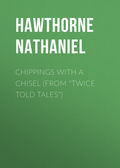INTRODUCTORY NOTE
THE DOLLIVER ROMANCE
In "The Dolliver Romance," only three chapters of which the author lived to complete, we get an intimation as to what would have been the ultimate form given to that romance founded on the Elixir of Life, for which "Septimius Felton" was the preliminary study. Having abandoned this study, and apparently forsaken the whole scheme in 1862, Hawthorne was moved to renew his meditation upon it in the following year; and as the plan of the romance had now seemingly developed to his satisfaction, he listened to the publisher's proposal that it should begin its course as a serial story in the "Atlantic Monthly" for January, 1864 – the first instance in which he had attempted such a mode of publication.
But the change from England to Massachusetts had been marked by, and had perhaps in part caused, a decline in his health. Illness in his family, the depressing and harrowing effect of the Civil War upon his sensibilities, and anxiety with regard to pecuniary affairs, all combined to make still further inroads upon his vitality; and so early as the autumn of 1862 Mrs. Hawthorne noted in her private diary that her husband was looking "miserably ill." At no time since boyhood had he suffered any serious sickness, and his strong constitution enabled him to rally from this first attack; but the gradual decline continued. After sending forth "Our Old Home," he had little strength for any employment more arduous than reading, or than walking his accustomed path among the pines and sweetfern on the hill behind The Wayside, known to his family as the Mount of Vision. The projected work, therefore, advanced but slowly. He wrote to Mr. Fields: —
"I don't see much probability of my having the first chapter of the Romance ready so soon as you want it. There are two or three chapters ready to be written, but I am not yet robust enough to begin, and I feel as if I should never carry it through."
The presentiment proved to be only too well founded. He had previously written: —
"There is something preternatural in my reluctance to begin. I linger at the threshold, and have a perception of very disagreeable phantasms to be encountered if I enter. I wish God had given me the faculty of writing a sunshiny book."
And again, in November, he says: "I foresee that there is little probability of my getting the first chapter ready by the 15th, although I have a resolute purpose to write it by the end of the month." He did indeed send it by that time, but it began to be apparent in January that he could not go on.
"Seriously," he says, in one letter, "my mind has, for the present, lost its temper and its fine edge, and I have an instinct that I had better keep quiet. Perhaps I shall have a new spirit of vigor if I wait quietly for it; perhaps not." In another: "I hardly know what to say to the public about this abortive Romance, though I know pretty well what the case will be. I shall never finish it… I cannot finish it unless a great change comes over me; and if I make too great an effort to do so, it will be my death."
Finally, work had to be given over indefinitely. In April he went southward with Mr. Ticknor, the senior partner of his publishing house; but Mr. Ticknor died suddenly in Philadelphia, and Hawthorne returned to The Wayside more feeble than ever. He lingered there a little while. Then, early in May, came the last effort to recover tone, by means of a carriage-journey, with his friend Ex-President Pierce, through the southern part of New Hampshire. A week passed, and all was ended: at the hotel in Plymouth, New Hampshire, where he and his companion had stopped to rest, he died in the night, between the 18th and the 19th of May, 1864. Like Thackeray and Dickens, he was touched by death's "petrific mace" before he had had time to do more than lay the groundwork and begin the main structure of the fiction he had in hand; and, as in the case of Thackeray, the suddenness of his decease has never been clearly accounted for. The precise nature of his malady was not known, since with quiet hopelessness he had refused to take medical advice. His friend Dr. Oliver Wendell Holmes was the only physician who had an opportunity to take even a cursory view of his case, which he did in the course of a brief walk and conversation in Boston before Hawthorne started with Mr. Pierce; but he was unable, with that slight opportunity, to reach any definite conclusion. Dr. Holmes prescribed and had put up for him a remedy to palliate some of the poignant symptoms, and this Hawthorne carried with him; but "I feared," Dr. Holmes writes to the editor, "that there was some internal organic – perhaps malignant – disease; for he looked wasted and as if stricken with a mortal illness."
The manuscript of the unfinished "Dolliver Romance" lay upon his coffin during the funeral services at Concord, but, contrary to the impression sometimes entertained on this point, was not buried with him. It is preserved in the Concord Public Library. The first chapter was published in the "Atlantic" as an isolated portion, soon after his death; and subsequently the second chapter, which he had been unable to revise, appeared in the same periodical. Between this and the third fragment there is a gap, for bridging which no material was found among his papers; but, after hesitating for several years, Mrs. Hawthorne copied and placed in the publishers' hands that final portion, which, with the two parts previously printed, constitutes the whole of what Hawthorne had put into tangible form.
Hawthorne had purposed prefixing a sketch of Thoreau, "because, from a tradition which he told me about this house of mine, I got the idea of a deathless man, which is now taking a shape very different from the original one." This refers to the tradition mentioned in the editor's note to "Septimius Felton," and forms a link in the interesting chain of evidence connecting that romance with the "Dolliver Romance." With the plan respecting Thoreau he combined the idea of writing an autobiographical preface, wherein The Wayside was to be described, after the manner of his Introduction to the "Mosses from an Old Manse"; but, so far as is known, nothing of this was ever actually committed to paper.
Beginning with the idea of producing an English romance, fragments of which remain to us in "The Ancestral Footstep," and the incomplete work known as "Doctor Grimshawe's Secret," he replaced these by another design, of which "Septimius Felton" represents the partial execution. But that elaborate study yielded, in its turn, to "The Dolliver Romance." The last-named work, had the author lived to carry it out, would doubtless have become the vehicle of a profound and pathetic drama, based on the instinctive yearning of man for an immortal existence, the attempted gratification of which would have been set forth in a variety of ways: First, through the selfish old sensualist, Colonel Dabney, who greedily seized the mysterious elixir and took such a draught of it that he perished on the spot; then, through the simple old Grandsir, anxious to live for Pansie's sake; and, perhaps, through Pansie herself, who, coming into the enjoyment of some ennobling love, would wish to defeat death, so that she might always keep the perfection of her mundane happiness, – all these forms of striving to be made the adumbration of a higher one, the shadow-play that should direct our minds to the true immortality beyond this world.
G. P. L.
THE DOLLIVER ROMANCE
A SCENE FROM THE DOLLIVER ROMANCE
Dr. Dolliver, a worthy personage of extreme antiquity, was aroused rather prematurely, one summer morning, by the shouts of the child Pansie, in an adjoining chamber, summoning old Martha (who performed the duties of nurse, housekeeper, and kitchen-maid, in the Doctor's establishment) to take up her little ladyship and dress her. The old gentleman woke with more than his customary alacrity, and, after taking a moment to gather his wits about him, pulled aside the faded moreen curtains of his ancient bed, and thrust his head into a beam of sunshine that caused him to wink and withdraw it again. This transitory glimpse of good Dr. Dolliver showed a flannel night-cap, fringed round with stray locks of silvery white hair, and surmounting a meagre and duskily yellow visage, which was crossed and criss-crossed with a record of his long life in wrinkles, faithfully written, no doubt, but with such cramped chirography of Father Time that the purport was illegible. It seemed hardly worth while for the patriarch to get out of bed any more, and bring his forlorn shadow into the summer day that was made for younger folks. The Doctor, however, was by no means of that opinion, being considerably encouraged towards the toil of living twenty-four hours longer by the comparative ease with which he found himself going through the usually painful process of bestirring his rusty joints (stiffened by the very rest and sleep that should have made them pliable) and putting them in a condition to bear his weight upon the floor. Nor was he absolutely disheartened by the idea of those tonsorial, ablutionary, and personally decorative labors which are apt to become so intolerably irksome to an old gentleman, after performing them daily and daily for fifty, sixty, or seventy years, and finding them still as immitigably recurrent as at first. Dr. Dolliver could nowise account for this happy condition of his spirits and physical energies, until he remembered taking an experimental sip of a certain cordial which was long ago prepared by his grandson, and carefully sealed up in a bottle, and had been reposited in a dark closet, among a parcel of effete medicines, ever since that gifted young man's death.
"It may have wrought effect upon me," thought the doctor, shaking his head as he lifted it again from the pillow. "It may be so; for poor Edward oftentimes instilled a strange efficacy into his perilous drugs. But I will rather believe it to be the operation of God's mercy, which may have temporarily invigorated my feeble age for little Pansie's sake."
A twinge of his familiar rheumatism, as he put his foot out of bed, taught him that he must not reckon too confidently upon even a day's respite from the intrusive family of aches and infirmities, which, with their proverbial fidelity to attachments once formed, had long been the closest acquaintances that the poor old gentleman had in the world. Nevertheless, he fancied the twinge a little less poignant than those of yesterday; and, moreover, after stinging him pretty smartly, it passed gradually off with a thrill, which, in its latter stages, grew to be almost agreeable. Pain is but pleasure too strongly emphasized. With cautious movements, and only a groan or two, the good Doctor transferred himself from the bed to the floor, where he stood awhile, gazing from one piece of quaint furniture to another (such as stiff-backed Mayflower chairs, an oaken chest-of-drawers carved cunningly with shapes of animals and wreaths of foliage, a table with multitudinous legs, a family record in faded embroidery, a shelf of black-bound books, a dirty heap of gallipots and phials in a dim corner), – gazing at these things, and steadying himself by the bedpost, while his inert brain, still partially benumbed with sleep, came slowly into accordance with the realities about him. The object which most helped to bring Dr. Dolliver completely to his waking perceptions was one that common observers might suppose to have been snatched bodily out of his dreams. The same sunbeam that had dazzled the doctor between the bed-curtains gleamed on the weather-beaten gilding which had once adorned this mysterious symbol, and showed it to be an enormous serpent, twining round a wooden post, and reaching quite from the floor of the chamber to its ceiling.
It was evidently a thing that could boast of considerable antiquity, the dry-rot having eaten out its eyes and gnawed away the tip of its tail; and it must have stood long exposed to the atmosphere, for a kind of gray moss had partially overspread its tarnished gilt surface, and a swallow, or other familiar little bird in some by-gone summer, seemed to have built its nest in the yawning and exaggerated mouth. It looked like a kind of Manichean idol, which might have been elevated on a pedestal for a century or so, enjoying the worship of its votaries in the open air, until the impious sect perished from among men, – all save old Dr. Dolliver, who had set up the monster in his bedchamber for the convenience of private devotion. But we are unpardonable in suggesting such a fantasy to the prejudice of our venerable friend, knowing him to have been as pious and upright a Christian, and with as little of the serpent in his character, as ever came of Puritan lineage. Not to make a further mystery about a very simple matter, this bedimmed and rotten reptile was once the medical emblem or apothecary's sign of the famous Dr. Swinnerton, who practised physic in the earlier days of New England, when a head of Aesculapius or Hippocrates would have vexed the souls of the righteous as savoring of heathendom. The ancient dispenser of drugs had therefore set up an image of the Brazen Serpent, and followed his business for many years with great credit, under this Scriptural device; and Dr. Dolliver, being the apprentice, pupil, and humble friend of the learned Swinnerton's old age, had inherited the symbolic snake, and much other valuable property by his bequest.
While the patriarch was putting on his small-clothes, he took care to stand in the parallelogram of bright sunshine that fell upon the uncarpeted floor. The summer warmth was very genial to his system, and yet made him shiver; his wintry veins rejoiced at it, though the reviving blood tingled through them with a half-painful and only half-pleasurable titillation. For the first few moments after creeping out of bed, he kept his back to the sunny window, and seemed mysteriously shy of glancing thitherward; but, as the June fervor pervaded him more and more thoroughly, he turned bravely about, and looked forth at a burial-ground on the corner of which he dwelt. There lay many an old acquaintance, who had gone to sleep with the flavor of Dr. Dolliver's tinctures and powders upon his tongue; it was the patient's final bitter taste of this world, and perhaps doomed to be a recollected nauseousness in the next. Yesterday, in the chill of his forlorn old age, the Doctor expected soon to stretch out his weary bones among that quiet community, and might scarcely have shrunk from the prospect on his own account, except, indeed, that he dreamily mixed up the infirmities of his present condition with the repose of the approaching one, being haunted by a notion that the damp earth, under the grass and dandelions, must needs be pernicious for his cough and his rheumatism. But, this morning, the cheerful sunbeams, or the mere taste of his grandson's cordial that he had taken at bedtime, or the fitful vigor that often sports irreverently with aged people, had caused an unfrozen drop of youthfulness, somewhere within him, to expand.
"Hem! ahem!" quoth the Doctor, hoping with one effort to clear his throat of the dregs of a ten-years' cough. "Matters are not so far gone with me as I thought. I have known mighty sensible men, when only a little age-stricken or otherwise out of sorts, to die of mere faint-heartedness, a great deal sooner than they need."
He shook his silvery head at his own image in the looking-glass, as if to impress the apothegm on that shadowy representative of himself; and, for his part, he determined to pluck up a spirit and live as long as he possibly could, if it were only for the sake of little Pansie, who stood as close to one extremity of human life as her great-grandfather to the other. This child of three years old occupied all the unfossilized portion of Dr. Dolliver's heart. Every other interest that he formerly had, and the entire confraternity of persons whom he once loved, had long ago departed; and the poor Doctor could not follow them, because the grasp of Pansie's baby-fingers held him back.
So he crammed a great silver watch into his fob, and drew on a patchwork morning-gown of an ancient fashion. Its original material was said to have been the embroidered front of his own wedding-waistcoat and the silken skirt of his wife's bridal attire, which his eldest granddaughter had taken from the carved chest-of-drawers, after poor Bessie, the beloved of his youth, had been half a century in the grave. Throughout many of the intervening years, as the garment got ragged, the spinsters of the old man's family had quilted their duty and affection into it in the shape of patches upon patches, rose-color, crimson, blue, violet, and green, and then (as their hopes faded, and their life kept growing shadier, and their attire took a sombre hue) sober gray and great fragments of funereal black, until the Doctor could revive the memory of most things that had befallen him by looking at his patchwork-gown, as it hung upon a chair. And now it was ragged again, and all the fingers that should have mended it were cold. It had an Eastern fragrance, too, a smell of drugs, strong-scented herbs, and spicy gums, gathered from the many potent infusions that had from time to time been spilt over it; so that, snuffing him afar off, you might have taken Dr. Dolliver for a mummy, and could hardly have been undeceived by his shrunken and torpid aspect, as he crept nearer.









